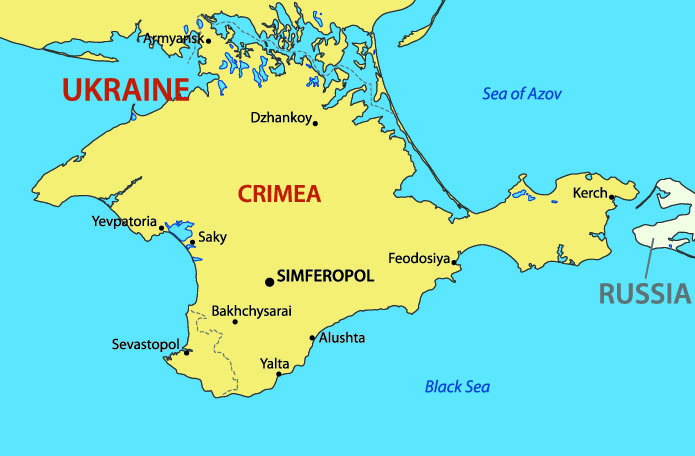
Temporarily occupied territory of CRIMEA
NEWS OF LEGAL REGULATION ON THE TEMPORARILY OCCUPIED TERRITORY OF CRIMEA
Lawyers included in the cross-industrial task force “Crimea” at Arzinger keep monitoring the legislative initiatives. They analyze regulations related to doing business in Crimea and take part in conferences, seminars and round tables on the topical problems of business activities in Crimea. This allows Arzinger to keep abreast of the recent developments, to inform you about the changes in the regulations (both contemplated and adopted), and to provide tailor-made solutions to our clients for their business activities on the temporarily occupied territory.
REAL ESTATE
The most interesting events of the period after our previous Legal Alert issue were the adoption of the law on the forced buy-out of property and the actual redistribution of powers in the state registration of rights to immovable property. Let us consider the news in more detail. Forced buy-out of real estate On July 9, 2014 the State Council of the Republic of Crimea passed the Bill “On Specifics of Buy-out of Strategic Assets in the Republic of Crimea” into law (hereinafter, the Law), which quickly became tagged “the law on forced buy-out of real estate.” The Law states that assets of strategic importance for the Republic of Crimea, regardless of who their owners are – individuals or entities, shall be subject to forced buy-out. However, the text of the Law contains no definition of “strategic assets.” The Russian legislation, too, contains neither a definition of strategic assets nor provisions on the buy- out of strategic assets. The Civil and Land Codes of the Russian Federation (hereinafter, the RF) stipulate the buy-out rules for land plots for state and municipal needs and provide an exhaustive list of such needs. The list of such assets that are strategically important for the peninsula is established by the Council of Ministers of the Republic of Crimea. According to the authorities, such enterprises as “Ukrtelecom”, “Krymenergo”, “Krymgaz”, etc. are among the first candidates. How much money the owners should get will also be decided by the Crimean Council of Ministers. The amount of payment will be calculated based on the outcome of monetary valuation to be carried out by a third-party organization accredited (licensed) in Russia. At the same time, the possibility and consequences of challenging the amount of damages are not spelled out expressly. In practice it means that having misappropriated the state property of Ukraine and local communities, the Crimean authorities intend to seize (take control over) private companies that are historically either natural monopolies or significantly influence certain markets due to their dominant position. Other businesses that may be fancied by the existing regime are also at risk, since the wording of the law is too vague and lays the foundation for raider schemes and economic reprisals against “wrong” owners that are disloyal to the government. One of the methods of abuse is the scheme for buy-out notification. If the Crimean Council of Ministers decides to buy out an object, the authority that has proposed that buy-out shall notify the relevant owner within five days. The notice is sent to the owner by registered mail. If the owner’s location (place of residence) is unknown, the information concerning the buy-out is published in the media. The owner of the assets to be bought out is deemed informed upon the publication of information in the media (which are not specified either). As the situation in the region in terms of citizenship, registration and employment is rather complicated and confusing, many people do not stay on the Crimea peninsula, while companies have not been re- registered. In other words, if an owner does not read Crimean media and received no letter from the government agencies, it will not be an obstacle for buying out his/her assets. It is also far from certain that the refund will wait for the owner. Therefore, based on our experience, we expect numerous abuses on the part of local authorities and interested individuals.
2 Legal Alert / Arzinger
Redistribution of powers in the field of state registration of rights Multiple sources among real estate specialists confirm that not a single legal (under the law of RF) real estate transaction has been concluded during the period of occupation of Crimea. This is due to the necessity to re-register ownership, to obtain cadastral numbers, to make new technical plans (passports) for real estate, etc., which takes some time. Moreover, the offices of the Russian State Register, which started their activities in Crimea and Sevastopol not a long time ago, have temporarily suspended thier activities at the beginning of August 2014. The reason was a change in the organizational structure, under which the state registration powers are transferred to local authorities. Accordingly, the documents to perform any actions during the relevant period are not accepted. In addition, there is information that Moscow gave an instruction not to register ownership of property in Crimea for Ukrainian banks. Supposedly, a procedure to nationalize the property Ukrainian banks (not pledged property, but bank-owned property) is planned for September. In view of this information, we carefully monitor the situation and elaborate asset rescue schemes.
Read more Arzinger_Crimea_Alert_August_12-2014_eng




